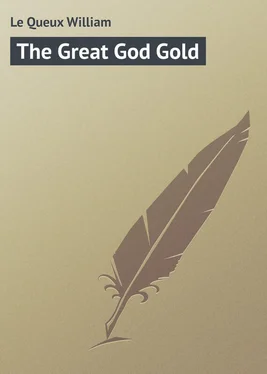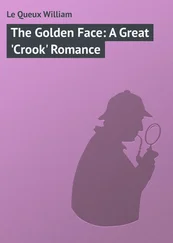William Le Queux - The Great God Gold
Здесь есть возможность читать онлайн «William Le Queux - The Great God Gold» — ознакомительный отрывок электронной книги совершенно бесплатно, а после прочтения отрывка купить полную версию. В некоторых случаях можно слушать аудио, скачать через торрент в формате fb2 и присутствует краткое содержание. Жанр: foreign_prose, на английском языке. Описание произведения, (предисловие) а так же отзывы посетителей доступны на портале библиотеки ЛибКат.
- Название:The Great God Gold
- Автор:
- Жанр:
- Год:неизвестен
- ISBN:нет данных
- Рейтинг книги:5 / 5. Голосов: 1
-
Избранное:Добавить в избранное
- Отзывы:
-
Ваша оценка:
- 100
- 1
- 2
- 3
- 4
- 5
The Great God Gold: краткое содержание, описание и аннотация
Предлагаем к чтению аннотацию, описание, краткое содержание или предисловие (зависит от того, что написал сам автор книги «The Great God Gold»). Если вы не нашли необходимую информацию о книге — напишите в комментариях, мы постараемся отыскать её.
The Great God Gold — читать онлайн ознакомительный отрывок
Ниже представлен текст книги, разбитый по страницам. Система сохранения места последней прочитанной страницы, позволяет с удобством читать онлайн бесплатно книгу «The Great God Gold», без необходимости каждый раз заново искать на чём Вы остановились. Поставьте закладку, и сможете в любой момент перейти на страницу, на которой закончили чтение.
Интервал:
Закладка:
“Certainly not. Why?” inquired the young man in some surprise.
“Oh, nothing,” replied the Professor with slight hesitation. “I – well – I only thought that it would be a little unfair to trouble me if somebody else had already been making any researches.”
“Nobody has seen it save myself, I can assure you. Diamond is a most careful and cautious man,” Frank declared. “He brought them straight over from Paris, and came at once to me.”
“He might possibly have shown them to somebody in Paris,” the elder man suggested.
“I asked him, and he distinctly told me that nobody save myself had set eyes upon them.”
The Professor sank into an armchair, and in silence took the cup of tea which Gwen handed to him.
“You’re tired, dad,” she said. “I see it in your face!”
“A little, dear. I’ve been at the Museum all day.”
“I wish you wouldn’t go to that horrid old place. It always gives you a headache, you know,” said the girl anxiously.
“Ah, my child,” replied the old man with a sigh, “the place holds, for me, much that is interesting in life – in fact all that is interesting, except your own neat little self.”
The girl laughed merrily, declaring that compliments should not be paid to her in the presence of Frank.
But the old man, sighing rather wearily, said:
“Well, Gwen, it’s the truth. I have nothing much to live for, except yourself and my studies. When your dear mother died, the sun of my life was extinguished. And now you have grown up to take her place.”
She and Frank exchanged quick meaning glances.
“I hope always to live near you, dear old dad, even after we’re married,” she said. “I shall never desert you.”
Her father smiled, saying:
“That is what every girl says to her parents before marriage. Few, however, fulfil their promise.”
“Well, dad, don’t let’s talk about parting till the time really comes,” exclaimed his daughter, in an endeavour to change the topic of conversation. Only a moment prior to the Professor’s return she and Frank had been discussing the future, and considering that very point.
“Have you been making researches in the Museum in connection with the burnt papers, Professor?” asked young Farquhar, who, standing in his well-cut suit of blue serge, looked a splendid specimen of the lithe, athletic young Englishman.
“Yes, I have.”
“And the result?”
The Professor shook his head in the negative.
“At present I have failed to discover the slightest title of corroboration of your friend Doctor Diamond’s wonderful theory. The construction which may be placed upon the scrappy statements are many, but none upon which I can yet form any absolute conclusion.”
He made no mention that he had caused photographic negatives of the burnt papers to be secured, or that, within his pocket, there reposed an accurate copy of the accepted original of the Book of Ezekiel.
“You are still in opposition, then, to Diamond’s theory?” asked the young man.
“Of course.”
“But why?”
The Professor drank his tea slowly, and replaced the cup upon the little table.
“Well,” he answered with much deliberation, “because Biblical history is entirely opposed to it. The first Book of Kings relates in detail the building of the temple by Solomon in B.C. 1012, the dimensions of the Porch, the Holy Place, and the Holy of Holies. Within and without the building was conspicuous by the lavish use of gold from Ophir and Parvaim. Above the sacred Ark, which was placed as of old in the Most Holy Place, were made new cherubim, one pair of whose wings met above the Ark and another pair reached to the walls behind them. In the Holy Place, besides the Altar of Incense, which was made of cedar overlaid with gold, there were seven golden candlesticks instead of one, and the table of the shew-bread was replaced by ten golden tables bearing beside the shew-bread the innumerable golden vessels for the service of the sanctuary. Instead of the brazen laver we know that there was a ‘molten sea’ of brass, a masterpiece of Hiram’s skill, for the ablutions of the priests. It was called a ‘sea’ from its great size, being five cubits in height ten in diameter and thirty in circumference, and containing, it is estimated, about sixteen thousand gallons of water. It stood upon twelve oxen, three towards each quarter of the heavens, and all looking outwards. The brim itself, or lip, was wrought ‘like the brim of a cup, with flowers of lilies,’ or curved outwards like a lily or lotus flower. The front of the porch was supported, after the manner of some Egyptian temples, by the two great brazen pillars Jachin and Boaz, eighteen cubits high, with capitols of five cubits more, adorned, as we are told, with lily-work and pomegranates.
“But,” he added, “all this is historical fact. In the temple reposed the most valuable collection of gold and jewels ever gathered together, and the dedication of the House of Jehovah, the God of Israel, was the grandest ceremony ever performed under the Mosaic dispensation. And if you read 1 Kings, viii, and 2 Chronicles, v, you will there learn how, at the ceremony, Jehovah gave the sign of His coming to take possession of His house. Then Solomon built his own house, placing within it the wonderful ‘wealth of Ormuz and Ind,’ and to him came the Queen of Sheba, an event which marked the culminating-point of his glory. The very king who built the glorious temple, and to whom Jehovah had twice given solemn warning in his old age, however, and under the influence of his wives, turned his heart away from God. He served Ashtoreth, the moon-goddess of the Zidonians, and Moloch, the ‘horrid king’ whom the Ammonites worshipped with human sacrifice. Solomon died in B.C. 976, and very shortly after his death the prophecy of Ahijah was fulfilled: his kingdom was rent in twain, and the parts, weakened by the disruption, formed the separate kingdoms of Judah and of Israel.”
“It will be interesting to trace the history of the temple from that date down to the siege of Jerusalem by Nebuchadnezzar,” remarked Frank.
“That occurred about three hundred years after Solomon’s death – at least according to our latest chronologers,” replied the Professor, “and it is in tracing that history that we have many of the points before us negatived most decisively. Let me instance one or two of them.”
“Yes, do, dad,” cried Gwen, greatly interested. “I’m quite excited, over the mysterious affair.”
“Then listen, child,” the old man said. “But, first go and get a Bible from the study.”
And the girl rose to do her father’s bidding.
Chapter Ten
Fact or Fiction
“I may perhaps with advantage give you very roughly some historical facts which tend to negative Diamond’s theory,” the Professor said, turning to Farquhar while Gwen was absent.
“That is what I’m most desirous of hearing,” replied the young man. “I can claim no special knowledge like yourself. Indeed, no man in England is more capable of expressing an opinion than you are.”
The Professor passed his hand through his scanty grey hair and smiled. He saw that his wide knowledge impressed this young man whose only thought was a “sensation” in one or other of the Gavin group of publications.
Then, when Gwen had re-entered the room with a Bible in her hand, he said in that slow, deliberate habit of his, the habit of the scholar and deep thinker:
“The theory of this Doctor Diamond is that the treasures of Solomon’s temple were hidden by the priests prior to the taking of Jerusalem by Nebuchadnezzar. Well, that is a bold but quite unsubstantiated assertion. As early after Solomon as the reign of Jeroboam the First, King of Judah, the golden calves, the symbols of the Heliopolitan deity, were set up in the two extremities of the kingdom, and the temple was put to sacrilegious usages. These sins were continued by his successors, until in the reign of Asa, the third King of Judah, the impure orgies of Ashtoreth were suppressed, for ‘having his heart perfect with Jehovah all his days’ the king repaired Shishak’s plunder – the first plunder of the temple, mark you – with ‘rich offerings of gold and of silver.’ Asa made war against the Ethiopians, and on returning to Jerusalem the prophet Azariah, son of Oded, met him and exhorted him and his subjects to be strong heart in hand in seeking God. He gave an affecting description of the former state of Israel: ‘For a long season Israel hath been (or was) without the true God, and without a teaching’ priest, and without law. (2 Chronicles, xv, 3.) His words roused the hearers to a new and more thorough reformation. The idols were removed from all the cities of Judah and Benjamin, and those which had been won from Ephraim. The altar of burnt-offering, which had been polluted by Jeroboam, was renewed, and in the third month of the fifteenth year (B.C. 940) Asa called a great convocation at Jerusalem. Jehoshaphat followed his father’s piety, but the darkest night of Israel’s spiritual declension came with the accession of Ahab, seventh King of Israel, and husband of Jezebel. The service of Baal was established throughout Israel, a grove was made for the orgies of Ashtoreth, and by Jezebel’s orders the prophets of Jehovah were put to death, all except one hundred who were hidden in a cave by Obadiah, the governor of Ahab’s house.”
Читать дальшеИнтервал:
Закладка:
Похожие книги на «The Great God Gold»
Представляем Вашему вниманию похожие книги на «The Great God Gold» списком для выбора. Мы отобрали схожую по названию и смыслу литературу в надежде предоставить читателям больше вариантов отыскать новые, интересные, ещё непрочитанные произведения.
Обсуждение, отзывы о книге «The Great God Gold» и просто собственные мнения читателей. Оставьте ваши комментарии, напишите, что Вы думаете о произведении, его смысле или главных героях. Укажите что конкретно понравилось, а что нет, и почему Вы так считаете.












